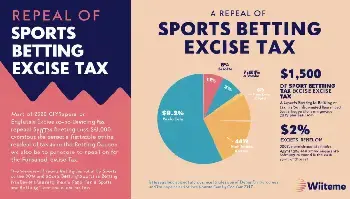U.S. Lawmakers Try to Remove Sports Betting Excise Tax Again

iGaming News, Casino Reviews and Games

Washington, D.C. – February 19, 2025
The push to eliminate an outdated federal tax on sports betting is back, as Representatives Dina Titus (Nevada) and Guy Reschenthaler (Pennsylvania) have refiled legislation to repeal the longstanding 0.25% excise tax on sports betting handles. This marks their fourth attempt, arguing that the tax, originally introduced in 1951, penalizes legal sportsbooks while allowing illegal operators to thrive. With sports betting now legal in 38 states and Washington, D.C., the competition is fierce, and this fight is heating up.
What Is the Sports Betting Excise Tax?
The federal excise tax on sports betting has been around since the 1950s, dating back to a time when lawmakers were cracking down on illegal gambling. Initially set at 10%, it was reduced to 0.25% in the 1970s. Today, the tax applies to the total amount wagered, not just the profit. For example, if a sportsbook takes in a $100 bet, it keeps around $5 (known as the "hold"), yet it still owes the government 25 cents on the complete $100. This translates to an effective 5% tax on gross gaming revenue (GGR), which quickly adds up.
In addition, sportsbooks must pay a $50 annual fee per employee, which legal operators argue places them at a competitive disadvantage. According to the American Gaming Association (AGA), the legal U.S. sports betting market handled $148 billion in wagers last year, resulting in nearly $370 million in excise tax revenue. Meanwhile, offshore operators who don't pay these taxes reportedly generated around $150 billion.
Why Do Titus and Reschenthaler Want to Repeal It?
Representatives Titus and Reschenthaler argue that the tax is outdated and does more harm than good. Titus, representing Nevada, calls it a "burden" that has "outlived its usefulness." In Nevada alone, sportsbooks handled over $8 billion in bets last year, costing them $66.8 million in federal excise taxes. Reschenthaler, from Pennsylvania, shares similar concerns, stating that the tax "rewards illegal operators who prey on consumers" while putting an unnecessary financial strain on legal businesses.
The two lawmakers have advocated for repealing this tax for years. They introduced H.R. 2350 several legislative sessions ago and refiled it in 2021, 2023, and now in 2025. With the rapid expansion of legal sports betting following the Supreme Court's repeal of the Professional and Amateur Sports Protection Act (PASPA) in 2018, they believe now is the time for Congress to act.
Industry Support and the Opposition
The AGA and major sportsbooks quickly supported the bill, arguing that eliminating the tax would level the playing field. Brandt Iden from Fanatics Betting & Gaming told iGaming Business, "Repealing this tax is a crucial step toward competing with offshore markets that offer no consumer protections."
However, not everyone agrees. The Gambling Addiction, Recovery, Investment, and Treatment (GRIT) Act presents an alternative approach. Instead of repealing the tax, it proposes keeping it but reallocating half of the revenue toward gambling addiction treatment programs. The GRIT Act is gaining traction among those concerned about the social consequences of expanded sports betting. The Tax Foundation also notes that while excise taxes are often justified to address negative effects like problem gambling and crime, much of the revenue currently goes into general government spending instead of targeted initiatives.
How Much Does This Tax Really Cost?
The numbers show that this tax is more burdensome than it appears. Sportsbooks typically retain only 5% of wagers, meaning the 0.25% excise tax takes a significant chunk of their profits. In some states, like New York, where the state tax on sportsbook revenue reaches 51%, the combined tax burden can exceed 10%, making it even harder for legal operators to compete.
Nevada’s numbers highlight the impact. In 2024, sportsbooks handled $2.7 billion in bets and paid $66.8 million in federal excise taxes on top of state taxes and operational costs. Meanwhile, offshore books, which pay no taxes, attract bettors looking for better odds and fewer restrictions.
What Happens Next?
The bill still faces a tough road in Congress. Past attempts to repeal the tax never even made it to a vote. However, the debate is gaining momentum with the booming sports betting industry and growing pressure from stakeholders. Supporters argue that eliminating the tax will drive more bettors from illegal sites to regulated platforms, boosting state revenues in the long run.
On the other side, GRIT Act proponents worry that repealing the tax would remove crucial funding for gambling addiction programs, which serve nearly a million Americans each year. This issue pits economic interests against social responsibility, creating a heated debate about the future of sports betting regulation.
Final Thoughts
The renewed push to eliminate the federal sports betting excise tax highlights how much the industry has evolved since 1951. Representatives Titus and Reschenthaler believe repealing the tax will strengthen legal operators and curb illegal markets. Now, they must convince Congress. With billions at stake and the industry watching closely, 2025 could be the year this outdated tax is finally repealed or restructured to serve a new purpose. Meanwhile, Hong Kong's legalizing basketball betting could further reshape the global sports gambling landscape.
To learn more about betting scandals, check out our article on Darts Player Prakash Jiwa, Banned for Eight Years Over Match-Fixing and Betting.

Bailey Haun
iGaming News, Casino Reviews and Games
I’m a passionate writer with over a decade of experience in the online gambling industry. Specializing in casino reviews, news, and game strategies. My background in journalism allows me to analyze casinos critically, focusing on key aspects like bonuses, game selection, and customer service.
